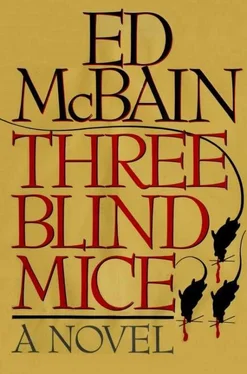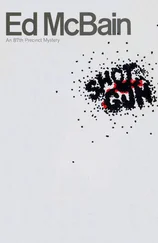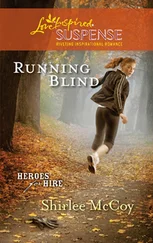Ed McBain - Three Blind Mice
Здесь есть возможность читать онлайн «Ed McBain - Three Blind Mice» весь текст электронной книги совершенно бесплатно (целиком полную версию без сокращений). В некоторых случаях можно слушать аудио, скачать через торрент в формате fb2 и присутствует краткое содержание. Город: New York, Год выпуска: 1990, ISBN: 1990, Издательство: Arcade, Жанр: Полицейский детектив, на английском языке. Описание произведения, (предисловие) а так же отзывы посетителей доступны на портале библиотеки ЛибКат.
- Название:Three Blind Mice
- Автор:
- Издательство:Arcade
- Жанр:
- Год:1990
- Город:New York
- ISBN:978-1559700801
- Рейтинг книги:3 / 5. Голосов: 1
-
Избранное:Добавить в избранное
- Отзывы:
-
Ваша оценка:
- 60
- 1
- 2
- 3
- 4
- 5
Three Blind Mice: краткое содержание, описание и аннотация
Предлагаем к чтению аннотацию, описание, краткое содержание или предисловие (зависит от того, что написал сам автор книги «Three Blind Mice»). Если вы не нашли необходимую информацию о книге — напишите в комментариях, мы постараемся отыскать её.
Three Blind Mice — читать онлайн бесплатно полную книгу (весь текст) целиком
Ниже представлен текст книги, разбитый по страницам. Система сохранения места последней прочитанной страницы, позволяет с удобством читать онлайн бесплатно книгу «Three Blind Mice», без необходимости каждый раз заново искать на чём Вы остановились. Поставьте закладку, и сможете в любой момент перейти на страницу, на которой закончили чтение.
Интервал:
Закладка:
They were sitting outside Tran’s shack, he on the low steps that led up to the front door, Mai Chim and Matthew on folding chairs he had carried out of the house. Tran was wearing thong sandals, grey shorts, and a white Disneyworld T-shirt emblazoned with a picture of the minarets of Fantasyland. Matthew was wearing a suit and a tie; he felt like a jackass in this heat.
“This was at eleven o’clock, or perhaps a little past eleven,” Mai Chim said. “It was quite hot, do you know, that night…”
…translating simultaneously and apparently literally, judging from her stilted and somewhat formal phrasing…
“… almost identical to that of my own country during the summer monsoon, the rainy season, do you know? The rain…”
… is heaviest between June and November when typhoons blow in off the South China Sea, But there are monsoons winter and summer, and there is no true “dry” season, except relatively. All of Vietnam lies entirely below the Tropic of Cancer, and the climate is therefore hot and humid all of the time, some eighty degrees Fahrenheit every month of the year, heavy rainfall all year round except during April and May.
“Vietnam is tropical, do you know? So we have mosquitoes and ticks and leeches, same as the Malay Peninsula. And we have, too, crocodiles and pythons and cobras and tigers and leopards and wild dogs…”
In the Mekong Delta, where Tran grew up as a boy and fought as a teenager and a man, the land was — and still is — extremely fertile and well cultivated. Tran’s father was a farmer, as was his father before him and Tran after him. Rice was their crop. Their little village — situated on a levee close by the Song Vam Co River — consisted of bamboo houses with thatched roofs, narrow streets laid out in a grid pattern, a bamboo fence around the entire site. During the summer monsoon, when the land was flooded, the only dry ground was on the levees and the dikes. Whenever there was a break in the rain, the family would sit outside the farmhouse with its small vegetable garden. Often on a hot, steamy night, Tran would look out over the flooded rice paddies to the mountains beyond Saigon and dream of wisdom beyond years, wealth beyond imagination. On just such a night, in the city of Calusa, Florida…
He has been sitting outside with the others in his family for, oh, it must have been almost two hours, do you know? His wife — two years older than he, but this is considered auspicious according to the horoscope — has already put their son to bed and then gone to bed herself because she must be at the factory at eight tomorrow morning. Tran sits outside with his three cousins. The men are smoking. The woman, who is quite homely, is dozing. In a little while, she and her husband, Tran’s older cousin, also go inside to bed.
Tran and the other man talk softly.
Smoke from their cigarettes swirls up on the air.
On U.S. 41, not two blocks away from the development, there is the hum of traffic, trailer trucks heading south to pick up Alligator Alley for the east coast, passenger cars driving down to nearby Venice or farther south to Naples or Fort Meyers.
The night is gentle.
Soft.
Tomorrow there will be deadly dull toil for subsistence wages, but for now there is the soft, gentle night.
At last, Tran’s younger cousin rises and yawns and goes into the house. The screen door slams shut behind him. Tran sits alone on the steps with his thoughts and the hot, still moistness of the night. The moon is full. He remembers nights like this on the delta, the rice fields stretching away to the horizon under an orange moon floating above.
He smokes.
He drifts.
He sees the man first from the comer of his eye.
A flicker of bright color, almost as if a sliver of moon has broken off and fallen to earth, glowing for an instant and then gone.
The house Tran and his family are renting is situated one row east and one house south of the one shared by the three men who were first accused and later cleared of raping that farmer’s wife. In his native Vietnam, before the Communists took over, murder and aggravated assault were among the most serious crimes, punishable by from five years in prison to death by guillotine, a means of execution inherited from the French occupiers. Tran further knows that rape in his country was considered aggravated assault, and he assumes that the crime is equally serious here in his adopted land.
He does not know how the Communists deal with such matters now, and he cannot possibly know that sexual battery — as rape is politely known in the Bible Belt state of Florida — is punishable by anywhere from fifteen years to death in the electric chair, depending upon the age of the victim and the amount of force threatened or applied. But it is his strong belief that crimes committed by any member of an ethnic or racial group reflect upon all members of that group, and therefore he is pleased that his countrymen have been exonerated of the crime. He knows them only slightly, but he thinks of them as decent, hardworking men, which — he freely admits to Matthew through Mai Chim — may be a biased opinion.
There is another burst of color on the night.
Sudden.
Catching the eye.
And then disappearing again.
It is very definitely a man, tall and broad-shouldered, very definitely an American man. Tran himself is slender and slight, his physique not uncommon in a nation where the average height for a grown man is a bit more than five feet and his weight some fifty-five kilos. The man running toward the house where the three men live is easily six feet tall…
Matthew’s heart begins sinking…
And he weighs at least ninety kilos…
Which Matthew calculates at two point two pounds per kilo for a total of two hundred pounds…
And he is wearing a yellow hat and a yellow jacket…
And Matthew’s heart sinks entirely.
“… going into the house,” Mai Chim translates, “where the three men were found murdered the next morning, do you know?”
Matthew knew.
4
Monday morning, the twentieth day of August, dawned hot and humid and hazy. Matthew awoke with the sun at ten minutes past seven and was in his pool swimming laps when the telephone rang. He swam over to the steps, picked up the modular phone, hit the talk button, and said, “Hello?” It could not have been later than a quarter to eight.
“Mr. Hope? It’s me. Andrew. I have that information you wanted.”
“Yes, Andrew, go ahead.”
“Running time of Casablanca is a hundred and three minutes. That’s an hour and forty-three minutes, sir.”
“Yes, Andrew.”
Leeds had told him they’d started watching the tape after dinner. He wondered now if Jessica had watched it all the way through. Or had she, like her husband, fallen asleep somewhere along the way?
“High tide was at one-thirty that Monday afternoon,” Andrew said, “low at seven fifty-four that evening.”
Which meant Leeds still would have had good water when he took the boat out that afternoon, and he’d have beat the outgoing tide when he came back in at six, six-thirty. His story checked out.
But Charlie Stubbs had claimed…
“High again at one forty-two on Tuesday morning,” Andrew said.
There it was.
The boat could have gone out again at ten-thirty, as Stubbs had claimed, when the tide was midway between high and low and the water still good enough for passage. And if the boat had come back in early on Tuesday morning, it would have caught the tide almost at full again, Matthew had no defense based on the navigability of Willowbee Creek.
“Thank you, Andrew,” he said, “that was very helpful.”
An addendum to the State Attorney’s response to Matthew’s demand for discovery was waiting on his desk when he got to the office at nine that morning.
Читать дальшеИнтервал:
Закладка:
Похожие книги на «Three Blind Mice»
Представляем Вашему вниманию похожие книги на «Three Blind Mice» списком для выбора. Мы отобрали схожую по названию и смыслу литературу в надежде предоставить читателям больше вариантов отыскать новые, интересные, ещё непрочитанные произведения.
Обсуждение, отзывы о книге «Three Blind Mice» и просто собственные мнения читателей. Оставьте ваши комментарии, напишите, что Вы думаете о произведении, его смысле или главных героях. Укажите что конкретно понравилось, а что нет, и почему Вы так считаете.












